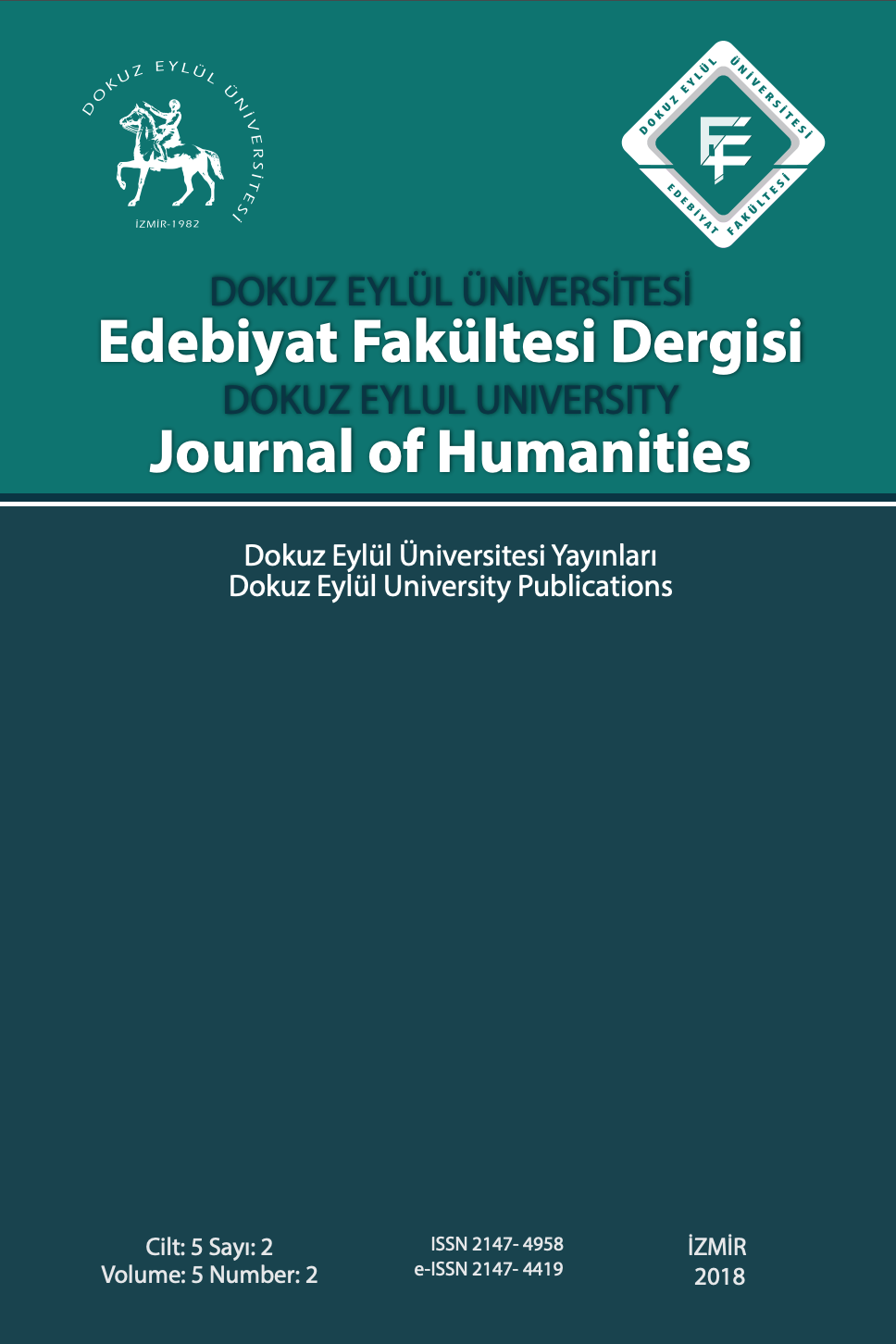JULIAN BARNES’IN THE NOISE OF TIME ADLI ESERİNDE HAFIZANIN İŞLEVİ VE TRAVMAYLA BAŞA ÇIKMAK
Julian Barnes the Noise of Time isimli romanında Rus besteci Dmitri Shostakovich’in yaşamını Sovyet rejimiyle olan üç travmatik deneyimi üzerinden anlatmaktadır. Shostakovich’in operasının rejimin propaganda aracı olan Pravda adlı gazete tarafından eleştirilmesi, Stalin’in emriyle New York’taki bir konferansa katılıp Sovyet rejimini desteklemeye zorlanması ve son olarak bestecinin politik baskıyla Sovyet partiye üye olması olarak özetlenebilecek bu üç olay Shostakovich’in benliğinde telafisi mümkün olmayan yaralar açar. Her bir travmatik deneyim ile bir önceki olayın izleri tekrar ortaya çıkar ve Shostakovich’in zihnini meşgul ederek besteciyi hem fiziksel hem de ruhsal olarak bir çöküşe sürükler. Roman boyunca Shostakovich çocukluğundan, gençliğinden ve yakın geçmişinden kesitler hatırlayarak yaşadığı kaygılar üzerine bir içsel çatışma sürdürür. Bu süreçte müziği ve çevresindeki olaylara karşı takındığı ironik tutumu besteciye geçirdiği zor zamanları atlatmada destek olur. İroni, içinde bulunduğu politik baskı karşısında akıl sağlığını korumasında; müziği ise kariyerini, ailesini, fiziksel ve ruhsal durumunu tehdit eden baskıcı rejim döneminde geleceği dair umudunu korumasında Shostakovich’e yardım eder. Bu romanında Barnes, Shostakovich’in zihnine ışık tutarak bir bireyin, özellikle de bir sanatçının, baskı karşısındaki çaresizliğini, hayatta kalma çabasını ve umudunu yitirmeme mücadelesini incelemektedir. Bu bakımdan bu makale, Julian Barnes’ın the Noise of Time adlı romanında hafızanın Shostakovich’in travmatik deneyimlerinin aktarılmasında nasıl bir işlev gördüğünü ve ironiye olan yatkınlığının yanı sıra Shostakovich’in sanatının baskıcı rejim altında hayatta kalmasına nasıl yardımcı olduğunu incelemeyi amaçlamaktadır.
Anahtar Kelimeler:
the noise of time, julian barnes, dmitri shostakovich, hafıza, travma, ironi
FUNCTION OF MEMORY AND COPING WITH TRAUMA IN JULIAN BARNES’S THE NOISE OF TIME
In the Noise of Time, Julian Barnes portrays the life of the Russian composer, Dmitri Shostakovich through his three traumatic encounters with the Soviet regime. These three events, namely Shostakovich’s opera being criticised by Pravda, the regime’s propaganda agency; his being forced by Stalin to attend a conference in New York and support the Soviet regime; and finally, the composer’s becoming a member of the Soviet party under the political pressure, cause irredeemable scars in Shostakovich’s mind. With each traumatic experience, the traces of the previous incident re-emerge and lead Shostakovich to a both physical and psychological downfall by haunting the composer’s mind. Throughout the novel, Shostakovich pursues a self-conflict regarding the anxiety he suffers by remembering fragments from his childhood, youth, and recent past. Through this process, his music and the ironic attitude he assumes towards the events around him serve the composer in overcoming the difficult times he goes through. Irony helps him to keep his sanity under the political oppression, and his music helps him not to lose his hope for the future in the time of an oppressive regime that threatens his career, his family, his physical and psychological condition. In his novel, Barnes explores an individual’s, especially an artist’s despair, his struggle for survival and for preserving his hope by shedding a light on Shostakovich’s mind. In this respect, this article aims to discuss how memory functions in recounting the traumatic experiences of Shostakovich in Julian Barnes’s the Noise of Time and how his art, along with his inclination to irony, helps the artist survive in the time of oppression.
Keywords:
the noise of time, julian barnes, dmitri shostakovich, memory, trauma, irony,
___
- Antakyalıoğlu, Z. (2018). Julian Barnes’s The Noise of Time As A Narrative Trauma. Pamukkale University Journal of Social Sciences Institute 33, 381-386.
- Baldwin, R. C., E. Chiu, C. Katona, and N. Graham (2002). Guidelines on Depression in Older People: Practising the Evidence. Boca Raton, FL: Taylor & Francis.
- Barnes, J. (2008). Nothing to be Frightened of. Toronto: Random House Canada.
- --- (2016). The Noise of Time. London: Penguin.
- BBC Newsnight (2016, February 7). Julian Barnes: The Full Interview – BBC Newsnight. YouTube. Retrieved from www.youtube.com/watch?v=gBAgKTtZMMQ
- Boutler, J. (2011). Melancholy and the Archive: Trauma, History and Memory in the Contemporary Novel. London: Continuum.
- Childs, P. (2011). Julian Barnes. Manchester: Manchester UP.
- Denk, J. (2016, May 9). ‘The Noise of Time,’ by Julian Barnes. The New York Times. Retrieved from https://www.nytimes.com/2016/05/15/books/review/the-noise-of-time-by-julian-barnes.html
- Fairclough, P. (2016, July 7). Julian Barnes’s The Noise of Time. Music and Literature. Retrieved from https://www.musicandliterature.org/reviews/2016/7/6/julian-barness-the-noise-of-time
- Giller, E. (1999, May). What is Psychological Trauma? The Anna Institute. Retrieved from theannainstitute.org. Hunt, N. C. (2010). Memory, War and Trauma. Cambridge, Cambridge UP.
- Lezard, N (2017, January 3). The Noise of Time by Julian Barnes review – Shostakovich in fear. The Guardian. Retrieved from https://www.theguardian.com/books/2017/jan/03/noise-of-time-julian-barnes-review-life-shostakovich
- Mcalpin, H. (2016, May 10). ‘The Noise of Time’ Can’t Drown Out Shostakovich. NPR. Retrieved from https://www.npr.org/2016/05/10/476486103/the-noise-of-time-cant-drown-out-shostakovich
- Nayebpour, K. (2017). Representation of Trauma as a Political Apparatus in Julian Barnes’s The Noise of Time. IUP Journal of English Studies, XII(4), 7-24.
- Neisser, U. and R. Fivush (1994). The Remembering Self: Construction and Accuracy in the Self-Narrative. Cambridge: Cambridge UP.
- Preston, Alex. “The Noise of Time review – Julian Barnes’s masterpiece.” theguardian.com. 17 Jan. 2016. Web. 14 Dec. 2019.
- Stavans, Ilan. “Memory and Literature.” Agni 48. The Translation Issue (1998): 79-90. JSTOR. Web. 20 Dec. 2019.
- Tulving, Endel. “What is Episodic Memory?” Current Directions in Psychological Science 2.3 (1993): 67-70. JSTOR. Web. 21 Dec. 2019.
- Volkov, Solomon. Testimony: The Memoirs of Dmitri Shostakovich. Trans. Antonina W. Bouis. NY: Limelight, 1984.
- White, Duncan. “The Noise of Time by Barnes, review: ‘black humour’.” telegraph.co.uk. 16 Jan 2016. Web. 14 Dec. 2019.
- ISSN: 2147-4958
- Yayın Aralığı: Yılda 2 Sayı
- Başlangıç: 2011
- Yayıncı: Dokuz Eylul Üniversitesi Matbası
Sayıdaki Diğer Makaleler
AKADEMİK SÖYLEM VE ÖRNEKLEME: FEN VE SOSYAL BİLİMLER MAKALELERİNDE ÖRNEKLEME BELİRLEYİCİLERİ
ALEV LYTLE CROUTIER’NİN YEDİ EVİN SIRLARI ESERİNDE ABD’NİN TEMSİLİ
TARİH ARAŞTIRMALARINDA SÖZLÜ TARİH YÖNTEMİ VE ÇEVRİMİÇİ SÖZLÜ TARİH ARŞİVLERİNDEN ÖRNEKLER
NİZAMEDDİN ŞÂMÎ VE ŞEREFEDDİN ALİ YEZDÎ’NİN ESERLERİNDE “OSMANLI” ALGISI1
“MACBETH” OYUNU TİYATRO AFİŞLERİNİN GÖSTERGEBİLİMSEL ÇÖZÜMLEMESİ
Burcu TUFAN, Kamil İŞERİ, Sibel ÇAPAN TEKİN
AĞIT VE ŞİFA: WALLACE SHAWN’UN THE DESIGNATED MOURNER OYUNUNDA RİTUEL
MAĞRİB VE ENDÜLÜS’TE BERBERÎ HÂKİMİYETİNİN MİMARLARI: ABDULLAH B. YÂSÎN VE YÛSUF B. TÂŞFÎN
